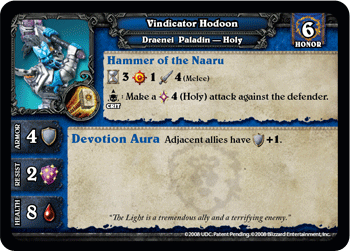 I have to admit I am an avid “World of Warcraft” fan. When the WoW Miniatures Game was announced I was sure I had to get my hands on one of the starter sets to try it out ASAP. Some time ago I finally had the opportunity to try this game out.
I have to admit I am an avid “World of Warcraft” fan. When the WoW Miniatures Game was announced I was sure I had to get my hands on one of the starter sets to try it out ASAP. Some time ago I finally had the opportunity to try this game out.
The standard starter box consists of four prepainted miniatures, a set of 10-sided dice, six detachable bases, a rulebook, character cards, ability cards and a two-sided paper map. The maps not only contain the play area but also a round timer and a victory point counter. The bases contain two dials used to show the miniatures current hitpoints and its iniative order.
The first thing noticeable when you open the box is that the miniatures are quite large and of better quality than most prepainted collectible miniatures. When you are a long time WoW player you may even identify the armor and weapons on the miniatures. The miniatures in the starter set are non-random. So you always get a draenei paladin, orc warrior, gnome mage and a blood elf priest. Each miniature comes with a character card, detailing its attacks and defenses, and two ability cards that can be used optionally. For our first game we didn’t use these abilities.
The game itself is similar to other skirmish tabletop games (like D&D Miniatures for example). There are two Victory Points on the map. You earn points for defeating enemies and for getting your miniatures to hexes adjacent these victory areas. The side that reaches a certain amount of points wins. Defeated miniatures respawn fully healed at the graveyard aka spawn point.
The interesting part of the game is the way actions and movement are handled. Each round is divided into ten “ticks”. When you make an action you adjust the “tick” dial on your miniatures base accordingly. At the start of the game every one has set his dial to 1. Making a certain attack costs 3 ticks, so you change the dial to 4. When everybody has moved and acted, the round timer is moved to the next tick. Imagine it’s currently the 3rd tick. Then every miniature which has set their dial to “3” may act. Since different actions cost different amounts of time, the iniative sequence is in constant flux.
Combat checks are made with pools of ten-sided dice. The attack of a unit has an attack of 3, the defender has an armor value of 2, so the attacker rolls 3 dice and his opponent two dice. Each die with a result of 4 or greater is an success. The attackers successes minus the defenders successes is the amount of HP lost. Magical attacks make magic damage that is soaked by Resist instead of Armor. A warrior for example may have some heavy armor but may be susceptible to magic damage.
The bases (called UBases) serve their purposes very well. They reminded me a bit of the combat dials from WizKids Games. But since there are only 6 bases in the box, you currently can’t do any larger battles as long as you don’t buy additional starter packs. The booster packs don’t contain any UBases.
Our first playtest lasted a couple of rounds. The games rules are pretty easy to understand (although it took us a while to understand the way “ticks” work) and the combat is fast and fun. We haven’t tried the optional Ability Cards, yet, that add some more tactical variation to the game. The game at this moment still lacks some variation in sceanrios you are able to play. Two maps are a bit few for my taste and some more interesting scenarios wouldn’t hurt. But I am sure Upper Deck has still some aces up its sleeve.
UPDATE: They have already released a free map kit and free tokens at their website, that you can download to spice up your game.
